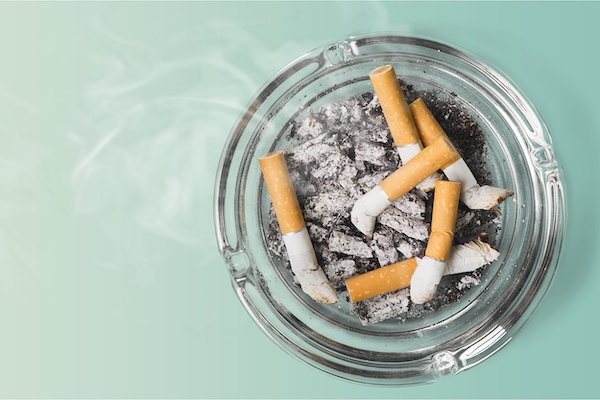David, who turns 50 this year, has been a smoker most of his adult life -— about three packs a week. That is, until last May when he decided to quit. Again. He’s tried four or five times before, but each of those failed attempts has taught him some lessons. This time, hopefully, he won’t repeat his past mistakes.
The longest stretch he went without a cigarette was about seven months. The most important lesson he has learned is this:
I made the mistake of thinking I could have just one.
David, who is trying to quit smoking
So, now he knows better, but it’s not always easy. Being in the midst of the COVID-19 pandemic helps, but it also presents new challenges.
The biggest challenge is that his job takes him out on the road quite a bit now whereas before, he spent a good part of it indoors in a smoke-free environment. These days, he says he’s often just one step away from wide-open spaces, where it would be easy to light up.
So far, he has resisted. Maybe the smoking patch he wears is helping. He also tried chewing gum, but didn’t like how it was “messing” with his teeth.
Except for work, he pretty much stays at home. He and his girlfriend used to enjoy going out for dinner and drinks, which often led to having a smoke. Now they eat at home and smoking is not allowed. His girlfriend is a nurse and had been urging him to quit. Needless to say, she’s his strongest supporter.
Most of his friends are non-smokers, but there are a few he’d meet for drinks and a smoke. There’s no place for them to gather right now, so that’s one trigger he doesn’t have to worry about. There are others though — in addition to his working environment.
When I’m home and have downtime I have to find something to keep myself busy. Doing something — playing music or doing a home improvement project — keeps me from wanting to take that cigarette break. I also try to avoid television programs or movies that show people smoking. If I see someone smoking, it makes me want one.
David
He says it wasn’t the pandemic that made him quit. He just got sick of not feeling great when he woke up, of having a bad taste in his mouth.
A good time to quit?

Elizabeth Deprey is a Tobacco Prevention Coordinator at Healthy Communities of the Capital Area (HCCA), serving Maine’s Kennebec County. She says now might just be a good time for some people to quit smoking because their routines have already been disrupted. When I asked her about smoking being a possible stress reliever, this was her response:
I know that some people do feel that they get a little bit of stress relief when they smoke or vape. But unfortunately, that is a momentary feeling, and then you actually feel more stressed as your body starts to feel that nicotine withdrawal.
Elizabeth Deprey, Program Coordinator, Tobacco Prevention, Healthy Communities of the Capital Area
Elizabeth’s job entails working with companies, healthcare entities, and towns to create environments that help support people trying to quit and help prevent others from using tobacco products in the first place.
We help create tobacco-free policies in businesses, in schools, in hospitals so that people who are trying to quit have places to go. If you want to walk off a craving, for instance, you can go to a smoke-free park or if you’re trying to make a positive change, you have a smoke-free workplace. Imagine trying to diet and somebody has a box of Krispy Kremes in the office every day — that’s not really a place where you can easily make a positive change. We’re trying to create these supportive environments through these policy changes and other prevention work.
Elizabeth Deprey
Establishing smoke-free policies hasn’t been top of mind for a lot of people and businesses during the pandemic, but Elizabeth thinks smokers would be wise to consider how their habit might interfere with their body’s ability to fight infections, including COVID-19.
Something to consider is that smoking affects your immune system, and this is not a time when you want to be impacting your immune system. We’re all scared about getting COVID-19. If you do get it you want your immune system to be in top fighting shape.
Elizabeth Deprey
Her concerns are backed up by the CDC, which urges people not to smoke, listing it as a COVID risk factor on its website.
Being a current or former cigarette smoker may increase your risk of severe illness from COVID-19. If you currently smoke, quit. If you used to smoke, don’t start again. If you’ve never smoked, don’t start.
Centers for Disease Control and Prevention (CDC)
If you agree that it would be a good time to quit, Elizabeth recommends turning to the Center for Tobacco Independence for support. It has a helpline called Maine QuitLink which provides phone and online coaching and individual services. You can visit the QuitLink website or call 1-800-QUIT-NOW. The resources are free and the counseling is individualized.
Quitting is not easy, says Elizabeth. You are dealing with a nicotine addiction as well as a strong habit. David certainly understands the challenges. He recommends finding things to keep you busy and trying to get some exercise.
Start out with easy workouts because you’ll feel the effects of smoking at first. I have a Wii game and I can make it as easy or difficult as I want, but even on easy, at the end of the workout, you can feel short of breath. Just stick with it.
David
And try not to get discouraged, in general. These are challenging times, even if you’re not trying to quit smoking. And if you are, even if you’re feeling better.
Now when I wake up I feel pretty good. But the pandemic has interfered with my mood. Every day I wake up and it’s the same. The things I used to enjoy doing aren’t available right now. There is a feeling of depression, not related to smoking but to the pandemic. As for quitting, you’ve got to keep with it. Even if you slip, don’t give up.
David


Adopting good habits and avoiding those which affects your health in a bad way is a must step that should be taken by any person. During the pandemic those who are having bad habits like drinking and smoking are more likely to get ill. It is essential to take care of your diet and ensure that you are not getting engaged in any harmful activities.
Dentist Malden